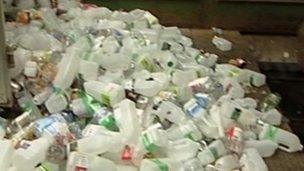South West recycling goes abroad
- Published

Local authorities in the South West say they are trying to reduce landfill costs
Some of the South West's recycling is being sent abroad for processing to help reduce landfill costs.
The majority of recyclable material collected in Devon, Cornwall, Somerset and Dorset is dealt with either locally or elsewhere in the UK.
However, about 5% goes abroad - including textiles and footwear which is shipped to developing countries in Africa, Asia and eastern Europe.
Hundreds of tonnes of plastic are sent to China, where costs are lower.
Somerset Waste Partnership told BBC Environment Correspondent Adrian Campbell that 95% of its recycling is being processed in the UK - with paper sent to Kent and steel sent to Port Talbot in Wales.
However, 98 tonnes of plastic was sent to Hong Kong last year, it said.
"We buy most of our products now from China and other countries, so perhaps it's not too surprising that to manufacture new products and packaging they need the material to go back there," spokesman David Mansell said.
Councils in the South West are trying to reduce the amount of waste going into landfill which has to be paid for.
Steve Burdis, from Dorset Waste Partnership, said it was "not in the interest" of any local authority to put recycling material back into landfill when costs are so high.
"Recycling has an income, whereas landfill is very rapidly getting up to £100 a tonne," he said.
Annette Dentith, from Devon County Council, said its current recycling rate was 55%.
Of that, she said, 95% was processed in the UK and 5% - mainly plastic and textiles were sent abroad.
SITA UK, which deals with Cornwall's waste, said some of its glass is shipped by a local Cornish company to Portugal, while some textiles are sent abroad.
"We don't want recycling material going into landfill - it's not waste, it's a commodity and we want to find an outlet," SITA's Mike Dobson said.
"If its local, that makes perfect sense, but that's not always possible."